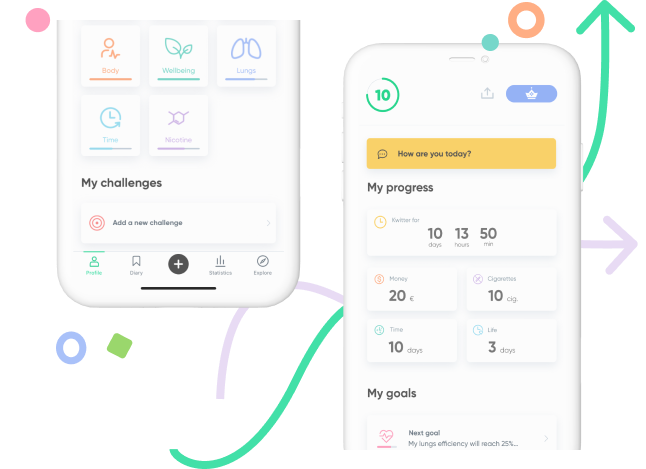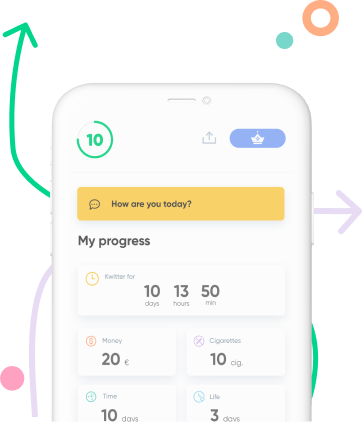March 19, 2019
Tips
I smoke, what are the consequences for my child?
You are a parent, you smoke and you want to know the consequences smoking has on your children? Kwit answers all your questions in this article.
When you are a parent, smoking is not just a personal matter. It concerns both fathers and mothers. Parents must be aware, in terms of health, of the impact of second-hand smoke on their surroundings, and on children in particular. In addition, parents should not underestimate the psychological impact on children. Indeed, smoking in front of them also means trivializing cigarettes and their dangers, and taking the risk that children may become smokers by mimicry. Deciphering: I smoke, what are the consequences for my child?
Smoking during pregnancy
It is worth recalling here the harmful effects of tobacco on the unborn child. Indeed, "Smoking cigarettes is probably the No. 1 cause of adverse outcomes for babies" according to Welch, chairman of the Department of Obstetrics and Gynecology at Providence Hospital in Southfield. During pregnancy, smoking increases the risk of accidents including Intrauterine Growth Restriction (IUGR), prematurity and, in the most serious cases, sudden infant death. Smoking implies a risk of prematurity, recalling that it is often associated with growth retardation.
Moreover, and it will come as no surprise that smoking disrupts lung growth. This will result in bronchial hyperactivity, bronchiolitis, pneumonia, chronic coughs and even asthma. In addition, the ENT sphere may be affected by chronic infections. If you have chosen to quit smoking during your pregnancy, feel free to have a look at our article giving you Guidelines for a tobacco-free pregnancy.
What is second-hand smoke?
Primary smoke is the smoke inhaled by smokers. As for second-hand smoke, it is the smoke inhaled by non-smokers. While these two types of smoke have common characteristics, they also have differences because second-hand smoke is produced at a lower temperature. In addition, it should be noted that second-hand smoke contains more chemicals than primary smoke. It contains about 4,000 chemicals, such as tar and nicotine, many of which are known to be carcinogenic.
The smoker causes second-hand smoke to be inhaled by those around him. We are talking about Passive Inhalation of Tobacco Smoke (IPFT), or passive smoking. It should be noted that tertiary smoke is also mentioned, i.e. the one that the smoker keeps on his clothes with particles that diffuse all around.
Impacts of parental smoking on children's health
We know the harmful effects of second-hand smoke on the people affected. But it must be understood that children, especially the youngest ones, are very sensitive to cigarette smoke. This is due to their growing lungs and brains and more intense breathing. This results in significant amounts of second-hand smoke inhalation.
Thus, among the harmful effects, nicotine can affect the development of brain cells and cognitive and behavioural functions, as well as the development of the lungs, which can lead to reduced respiratory capacity and predisposition to asthma and chronic bronchitis.
Moreover, and it should not be forgotten, children of smokers are more affected than others by ear infections, pneumonia and other respiratory infections.
Psychological impact of parental smoking on children
Nicotine is known to increase dopamine levels in the brain and cause sensations of pleasure and psychological impact of parental smoking on children's well-being that make the smoker dependent. Also and naturally, children exposed to second-hand smoke are more vulnerable to nicotine addiction and therefore to becoming smokers from adolescence.
Also, if the pre-teen starts smoking, the smoking parent will have no credibility to prevent him from touching the cigarette. And the child who starts smoking, for various reasons, will also have the parent's "bad example"! In fact, smoking for a child who has become a teenager whose parents smoke is like entering a familiar adult world.

Psychological impact of parental smoking on children
Of course, when you are a parent, the ideal thing to do is to stop smoking and you will protect your children from the harmful effects of tobacco.
To do this, get help. You can, for example, download Kwit! Since withdrawal can take a long time and relapses are frequent, here are some good habits to adopt:
Do not allow tobacco inside the house.
Tell your relatives that you quit smoking; they will support you and help you avoid risky situations.
Keep in mind the reasons you quit smoking. They will help you to avoid relapse. You can also carry a picture of your children with you, which will remind you that you are also acting for their good.
In addition, it is important to get rid of the illusion that smoking near the open window, ventilating the room where you have smoked or smoking in another room is enough to protect your children. Studies have shown that the harmful effects of second-hand and third-hand smoke are difficult to remove.




